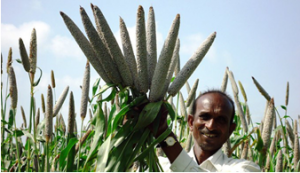|
Fruit Fly`s Genetic Code Revealed
Monday, 2016/10/10 | 08:20:44
|
|
Figure: A close up of the Mediterranean fruit fly, Ceratitis capitata. Click the image for more information about it.
By Jan Suszkiw
An international team of scientists from the U.S. Department of Agriculture (USDA) and other research organizations have sequenced the complete genome of the Mediterranean fruit fly, Ceratitis capitata. This pest attacks more than 260 fruit, vegetable and nut crops worldwide, causing billions of dollars annually in direct damage, export sanctions, lost markets, and other costs.
Reported in the September issue of Genome Biology, this advance is like finding the medfly's playbook of life. It gives researchers an edge in spotting weaknesses to exploit, particularly genes tied to the pest's ability to reproduce, withstand pathogens, find host plants, and break down environmental toxins. The advance should also foster greater understanding of how the insect's genetics make it such a successful invasive pest.
The researchers plan on "mining" the medfly's genome for information that could improve the effectiveness of the Sterile Insect Technique (SIT). An approach used worldwide, SIT involves mass-rearing medflies in the lab and sterilizing the males for release into the wild to mate, resulting in eggs that won't hatch.
Combining SIT releases with baits and other measures eventually eradicates medfly populations. It can also work as a preventative measure, notes Al Handler, a research geneticist with the USDA-Agricultural Research Service's (ARS) Center for Medical, Agricultural and Veterinary Entomology (CMAVE) in Gainesville, Florida.
Handler, together with Marc Schetelig, a professor at Justus-Liebig-University Giessen in Germany, led a group of 64 scientists from 25 research organizations throughout the world who contributed to the "Mediterranean Fruit Fly Whole-Genome Sequencing Project."
Handler's work includes developing methods to genetically sort fruit flies by sex and genetically sterilize the males for SIT releases. Doing so should improve the cost-effectiveness and efficacy of this important biobased pest-population control method.
Once a female medfly has mated, she'll deposit one to ten eggs just below the skin of the host fruit or vegetable. Maggots then emerge, damaging the fruit or vegetable and exposing it to rotting. The maggots later pupate in the ground and emerge as adult flies, ready to mate in a few days and start the cycle again.
With the medfly's genome sequence decoded, scientists can begin to explore new ways to break the reproductive cycle, as well as gain critical insight into how the pest invades and adapts to new habitats in tropical and subtropical regions of the world. Importantly, this information should also help control other closely related insects, including the Oriental and Mexican fruit flies.
ARS is USDA's chief intramural scientific research agency.
See: https://www.ars.usda.gov/news-events/news/research-news/2016/fruit-flys-genetic-code-revealed/ |
|
|
|
[ Other News ]___________________________________________________
|


 Curently online :
Curently online :
 Total visitors :
Total visitors :
(35).png)



















